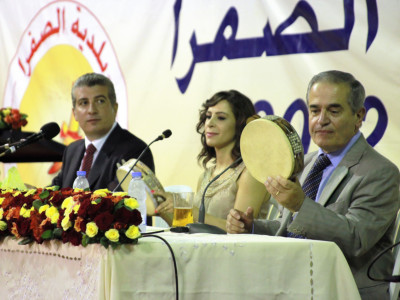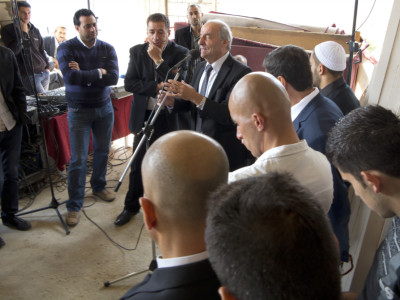Al-Zajal, recited or sung poetry
 In Lebanon, Al-Zajal is folk poetry that is declaimed or sung daily, during life events (marriages and funerals) and large group events. The performers, men and women from local communities, and poets called qûâl or zajjâl, express themselves individually or collectively on different themes (life, love, nostalgia, death, politics, etc.) depicting daily events or significant occasions.
In Lebanon, Al-Zajal is folk poetry that is declaimed or sung daily, during life events (marriages and funerals) and large group events. The performers, men and women from local communities, and poets called qûâl or zajjâl, express themselves individually or collectively on different themes (life, love, nostalgia, death, politics, etc.) depicting daily events or significant occasions.
One of the best-known collective forms of al-Zajal is poetic spontaneous jousts, which are performed to the rhythm of the tambourine (daf) and the derbouka (derbakeh). These public performances bring together troupes of poets and musicians, forming a chorus in front of an audience that includes people of all ages, social classes, and religious communities. Seated around a table filled with dishes of mezze and arak, the poets improvise poems, challenging each other, while the singers and the audience repeat the verses, applauding to a cadenced rhythm. The musicians accompany the verses and play musical interludes.
The performers and folk poets recite a frequently renewed repertoire. In poetic jousts, new musical instruments (synthesizer, bouzouki, etc.) are being introduced. Women, traditionally excluded from these games, have begun to appear in public performances.
These performances are typically organized by local entities such as municipalities, cultural clubs, or festival officials. Professional al-Zajal poets also make appearances on television or radio programs, reaching thousands of viewers or listeners. Some of them even post recordings of their performances on social networks.
Al-Zajal involves performers and participants from local communities, including families, neighbors, people of all ages, and children. The transmission of al-Zajal occurs through observation, participation, memorization, imitation, and documentation.
 Communities, groups, and individuals recognize that Al-Zajal is one of the main elements of the common core of Lebanon’s intangible cultural heritage. It is characterized by its religious and communitarian inclusiveness. It expresses a sense of belonging to the Lebanese national identity and ensures its continuity. Al-Zajal fosters dialogue and respect among the Lebanese and is not contrary to human rights. (https://ich.unesco.org › al-zajal-recited-or-sung-poetry…)
Communities, groups, and individuals recognize that Al-Zajal is one of the main elements of the common core of Lebanon’s intangible cultural heritage. It is characterized by its religious and communitarian inclusiveness. It expresses a sense of belonging to the Lebanese national identity and ensures its continuity. Al-Zajal fosters dialogue and respect among the Lebanese and is not contrary to human rights. (https://ich.unesco.org › al-zajal-recited-or-sung-poetry…)

